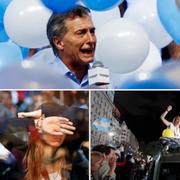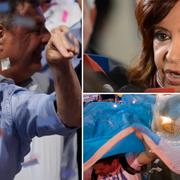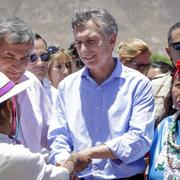
Kirchner tar farväl efter tolv år vid makten
På söndag går Argentina till val för att utse ny president. Cristina Fernández de Kirchner – som vunnit två gånger i rad och enligt konstitutionen inte får ställa upp en tredje gång – har handplockat sin efterträdare, Daniel Scioli, och ”kirchnerismen” tros bestå även efter valet.
– Han kanske står mer till mitten än Cristina Kirchner, men han har lovat kontinuitet och stabilitet om han vinner, säger Lena Karlsson, redaktör på Utrikespolitiska institutet, till TT.
Paret Kirchner nationaliserade landets pensionssystem, oljeindustrin och det nationella flygbolaget. Deras reformer har medfört bättre tillgång till sjukvård och utbildning.
– Cristina är populär inom den argentinska vänstern, säger Lena Karlsson.
bakgrund
Det här är ”kirchnerism”
Wikipedia (en)
Kirchnerism (Spanish kirchnerismo) is a Argentinian political philosophy and supporters of the late Néstor Kirchner, president of Argentina from 2003 to 2007, and of his wife Cristina Fernández de Kirchner, who has been president since 2007. Although the Kirchners are members of the Justicialist Party (the original, official and largest Peronist party, founded by Juan Perón in 1947), Peronism itself is a broad movement, and many Peronists oppose them ("Anti-Kirchnerist Peronism").
On the other hand, Kirchnerism, although originally a faction in the Justicialist Party, later received support from other smaller Argentine political parties (like the Communist Party or the Humanist Party), and from factions of some traditional parties (like the Radical Civic Union and the Socialist Party). In parties which are divided along Kirchnerist/Anti-Kirchnerist lines, the members of the Kirchnerist faction are often distinguished with the letter K (for instance "peronistas/justicialistas K", "radicales K" or "socialistas K"), while the factions opposing kirchnerism are similarly labeled with the expression Anti-K.
In response to the rise of Kirchnerism, the term "Anti-Kirchnerism" has arisen to describe those sectors and persons, as much within as without Peronism, who opposed the governments of Néstor Kirchner and Cristina Fernández.
Omni är politiskt obundna och oberoende. Vi strävar efter att ge fler perspektiv på nyheterna. Har du frågor eller synpunkter kring vår rapportering? Kontakta redaktionen



